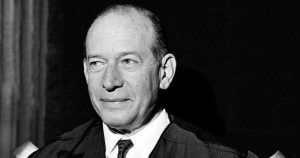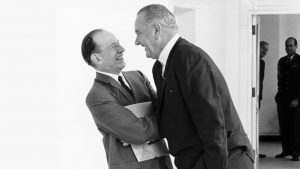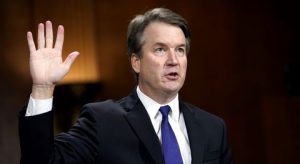My latest column that run Friday, October 5, 2018 in the Lewiston (Idaho) Tribune.
———-
Most Americans today won’t recognize his name. When he resigned in disgrace from the U.S. Supreme Court in 1969 he mostly disappeared from public life, remembered now only as a footnote in the evolving story of increasing partisan hostility over membership on the highest court in the land.
It wouldn’t be correct to say that the politicization of the court began with Abe Fortas – judicial nominations are and have always been inherently political – but what happened to Fortas does provide a cautionary tale for today’s Senate as it struggles with the tortured process of assessing Judge Brett Kavanaugh’s fitness for a lifetime appointment.

Fortas, like Brett Kavanaugh, was not merely a creature of the political process but a deeply partisan political player who, like Kavanaugh owed his appointment to a flawed process engineered by a flawed president.
Fortas was, like Kavanaugh, a Yale Law grad, and was one of the bright young lawyers who populated the administration of President Franklin Roosevelt. In the 1940s Fortas helped found a high-powered D.C. law firm – today’s Arnold and Porter – where he represented deep pocket corporate clients and maintained his extensive and lucrative political connections.
When his friend Lyndon Johnson needed legal help to make certain his contested 87-vote victory in a 1948 Texas Senate race would hold up under scrutiny he called Fortas. After Johnson won a landslide election as president in 1964, like most presidents he wanted to put his mark on the Supreme Court. Johnson being Johnson, he literally forced Associate Justice Arthur Goldberg off the court in order to appoint his pal Fortas. He was confirmed and that decision seemed, briefly, to cement a liberal lean to the Supreme Court for a long time to come.
But, in a variation of the old line that you can make God laugh by telling him your plans, Johnson – and Fortas –overreached. Badly. When, near the end of Johnson’s presidency in 1968, Chief Justice Earl Warren announced his retirement, LBJ was certain he could replace Warren as chief justice by ramming a Fortas nomination through a Senate controlled by Democrats. Shades of the current controversy – Johnson insisted on speedy Senate action. Don’t ask a lot of questions, he said, just confirm him – quickly.

Conservative southern Democrats and Senate Republicans refused to go along with the hurry up process, particularly after it was disclosed that Fortas had been the beneficiary of a sweetheart deal that paid him a tidy sum to teach at American University, a deal not financed by the college, but by former clients at his old law firm. It was also revealed that the justice had been a regular advisor to Johnson, counseling the president on PR strategy regarding the war in Vietnam, attending cabinet meetings and even drafting a state of the union speech for LBJ. Fortas, with the surety of a Brett Kavanaugh, dissembled about his involvement and ultimately a Senate filibuster killed his appointment as chief justice.
But even as Fortas stayed on the court, the drip, drip of scandal would not stop. And finally when another sweetheart consulting gig involving a shady friend was unearthed Fortas’s time was up. He resigned from the court in disgrace in the spring of 1969. He died in 1982.
So play this out 50 years later with another highly partisan court appointment. Kavanaugh has left not only a vast and still undisclosed paper trail of his activities and views of the George W. Bush White House, but now has had two appearances before the Senate Judiciary Committee where, to be charitable, he has been at best guilty of less than subtle obfuscation.
The president of the United States has outsourced judicial vetting to the most extreme partisans in the community of GOP special interests who want to complete the full politicization of the court. He has, like LBJ in 1965, looked beyond talent and temperament to put a politician on the bench.
No matter what happens with the Kavanaugh nomination – let’s assume he is narrowly confirmed amid continuing controversy about his past and his truthfulness – the scrutiny, just like with Abe Fortas, will not suddenly disappear.

There is a better than even chance that Democrats will win control of the U.S. House of Representatives in the fall and a feisty New Yorker by the name of Jerrold Nadler will become chairman of the House Judiciary Committee. Last weekend Nadler seemed to be reaching back in time when he said: “We cannot have a justice on the SupremeCourt for the next several decades who will be deciding questions of liberty and life and death and all kinds of things for the entire American people who has been credibly accused of sexual assaults, who has been credibly accused of various other … wrong things, including perjury. This has gotta be thoroughly investigated. I hope the Senate will do so. If he is on the Supreme Court and the Senate hasn’t investigated, then the House will have to.”
Based upon what the Supreme Court should be – independent, free of obvious partisan taint, above politics to the extent that is possible – it’s easy to see that Lyndon Johnson made a historic mistake in 1965 appointing an unabashed partisan to the court. Johnson knew what he was doing. He wanted his guy in there. History shows us how that turned out. Donald Trump also wants his guy on the court, a judge who has wondered out loud if constraints on presidential power are appropriate and, credible questions of past conduct aside, believes he is being put upon only as “revenge on the behalf of the Clintons.” The lesson is clear: controversial, highly partisan nominees are bad for the court and bad for the country.
In his biography of Abe Fortas, historian Bruce Allen Murphy notes that a portrait of Fortas that once hung in a prominent place in the Yale law school has now disappeared from the New Haven campus. Does a similar fate await a new justice? We’re going to find out.
